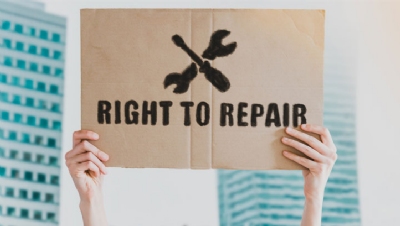Manufacturers of goods including washing machines, TVs and fridges will be mandated to do more to help customers repair them for longer from this week, under new Government rules.
The Government claims the new rules could extend the lifespan of some products by 10 years
Known as ‘right to repair’ laws, the new requirements mandate manufacturers to make spare parts for electrical appliances available within two years of all model launches, and then for between seven and 10 years after the model is discontinued, depending on the type of product.
In the first instance, the rules will only apply to companies producing dishwashers, washing machines, washer-dryers, dryers, fridges, freezers, televisions and “other electronic displays” for home use. Laptops, tablets and smartphones are notably excluded from this latter category.
For appliances used by businesses, the rules also cover electric motors, vending machines, retail fridges and freezers, power transformers, welding equipment and light sources. Further products may be added to the requirements in the coming years.
Products do not need to be under warranty for customers to access spare parts and repair information. However, in some cases, parts will only be made available to tradespeople who are qualified to give repair services, for health and safety reasons.
The EU notably published its Circular Economy Action Plan last year; a policy package that includes right to repair mandates. The UK agreed to develop mandates in line with the EU’s before Brexit.
The Department for Food, the Environment and Rural Affairs (Defra) claims that the UK ‘right to repair’ package could extend the lifespan of products by up to 10 years and save the average household £75 per year in repair, replacement and energy bill costs when compounded by new energy efficiency rules for appliances.
“The tougher standards will ensure more of our electrical goods can be fixed rather than have to be thrown away when they stop working, putting more money back in the pockets of consumers,” Business and Energy Minister Anne-Marie Trevelyan said.
But some groups, including Which? and Green Alliance, would have liked to have seen the mandate go further.
Green Alliance’s head of resource policy Libby Peake said the new rules “represent a small, first step towards giving people the long-lasting repairable products they want”.
Peake said: “The Government hasn’t given consumers a legal right to repair, as the spare parts and repairability criteria are only directed at professional repairers, not at the people who own products.
“There is also no guarantee that spare parts and repair services will be affordable, so considerable barriers remain to making this the easiest, default option.”
Independent design consultant Matthew Cockerill added: “Right now, spare parts are available that will help prevent the life of some products being cut short if a single component fails – although it remains to be seen how widely this is adopted; affordability being a critical factor. Products like jet washers often fail through a core component failure like a pump housing. Available if you search hard enough but often costing 60% of the price of whole new product.
“So, we still have a long way to go when it comes to the way our technology products are designed, manufactured, sold, shipped, repaired, remanufactured, and finally recycled.
“At the moment, companies are still largely at liberty to create as many things as they like, leveraging every new technology or product innovation to drive performance and sales. But increasing social, political and climate pressures are going to mean this will soon be seen as unacceptable by the general public. We can’t simply rely on repair and recycling to reduce the waste we continue to generate.”
E-waste mountain
Waste from electronics and electricals is the world’s fastest-growing domestic waste stream. According to the UN’s global e-waste monitor, a record 53.6 million metric tonnes of electronic waste was generated globally in 2019, with the waste stream having increased by more than one-fifth since 2014. The value of items wasted in 2019 is estimated to be more than $57bn.
A recent policy paper by Green Alliance revealed that the UK generates the second-highest amount of e-waste per person annually, with only Norway faring worse. The majority of this waste is not recorded as recycled, with e-waste pollution being a growing concern for some developing nations and regions.
MPs on the Environmental Audit Committee (EAC) are in the process of drafting recommendations for further policy interventions to tackle the problem, following an inquiry last year. At the same time, Defra is consulting on the implementation of the UK’s Resources and Waste Strategy, following Covid-19-related delays.
Sarah George
Credit: Source link











